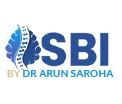Blood Clot Brain Treatment in India | Dr. Arun Saroha

Understanding Blood Clot
A blood clot is a mass of blood that changes from a liquid to a gel-like or semi-solid state. While clotting is a natural process that helps prevent excessive bleeding from injuries, clots can become dangerous when they form abnormally within blood vessels. When a clot forms in a vein or artery, it can obstruct blood flow, leading to serious medical conditions. If a clot travels to vital organs such as the brain, heart, or lungs, it can result in life-threatening complications.
Blood clots can develop for various reasons, including lifestyle factors, genetic predisposition, or certain medical conditions. When a blood clot blocks the flow of blood in the brain, it can cause severe damage, leading to strokes or other neurological issues. Early diagnosis and treatment are crucial in managing blood clots to prevent further complications. For individuals seeking Blood Clot Brain Treatment in India, advanced medical procedures and medications are available to dissolve or remove clots effectively.
What is a Blood Clot in the Brain?
A blood clot in the brain, also known as a cerebral thrombosis, occurs when a blood vessel in the brain is obstructed by a clot. This blockage prevents oxygen-rich blood from reaching brain tissue, causing the affected brain cells to become damaged or die. The result can be a stroke, which may lead to long-term neurological deficits or even death if not treated promptly.
There are various risk factors for developing a blood clot in the brain, including high blood pressure, high cholesterol, diabetes, smoking, and certain clotting disorders. Individuals who suffer from these conditions are at a higher risk of forming clots that could travel to the brain, blocking essential blood flow.
Blood Clot Brain Surgery in India offers both minimally invasive procedures like thrombectomy and more invasive options like craniotomy to treat patients who suffer from these dangerous clots. Specialized medical care and advanced technology allow for effective management of this life-threatening condition.
Causes of Blood Clots in Brain
Atherosclerosis
This is the buildup of fatty deposits (plaques) in the arteries. Over time, these plaques can narrow the arteries, slowing blood flow and increasing the risk of clots forming. If a plaque ruptures, it can trigger the formation of a blood clot, which can travel to the brain and block blood flow.
High Blood Pressure
Chronically elevated blood pressure damages the blood vessel walls, making them more prone to clot formation. The increased pressure on the vessels can lead to small tears, where clots may develop.
Smoking
Smoking damages the lining of blood vessels, making it easier for clots to form. It also reduces the amount of oxygen in the blood and increases the likelihood of plaque buildup in arteries.
Obesity
Excess body weight puts additional strain on the heart and circulatory system. Obesity also contributes to conditions like high blood pressure and high cholesterol, further increasing the risk of blood clots.
Age
As people age, their blood vessels lose elasticity, making them more susceptible to damage and clot formation. The risk of blood clots increases significantly after the age of 60.
Dehydration
Not drinking enough fluids can cause blood to thicken, making it more likely to clot. Dehydration reduces the volume of blood, increasing the concentration of clotting factors.
Common Symptoms of Blood Clots in Brain
Sudden Weakness or Numbness
One of the most common symptoms of a blood clot in the brain is sudden weakness or numbness, typically affecting one side of the body. This symptom can range from mild to severe and may lead to complete paralysis on one side.
Severe Headache
Individuals may experience a sudden, intense headache that they describe as the worst headache of their life. This can be a sign of a blood clot causing a stroke.
Blurred or Double Vision
Changes in vision, such as blurred or double vision, can occur when a blood clot impacts the brain’s visual processing areas. This symptom can develop suddenly and may affect one or both eyes.
Trouble Walking or Loss of Coordination
A blood clot in the brain can affect motor skills, leading to difficulty walking or performing fine motor tasks. This is often accompanied by weakness or numbness on one side of the body.
Paralysis in the Face, Arm, or Leg
Blood clots in the brain may cause sudden paralysis, typically affecting the face, arm, or leg on one side of the body. This symptom is a strong indicator of a stroke and requires immediate medical attention.
Why Choose Dr. Arun Saroha for Blood Clot Brain Treatment in India?

Dr. Arun Saroha is a renowned neurosurgeon with over 29 years of experience, making him one of the top choices for Blood Clot Brain Surgery in India. His expertise in treating complex neurological conditions, including brain clots, has earned him a reputation for delivering successful outcomes with precision and care.
Dr. Saroha's extensive experience includes performing over 7,000 surgeries, including minimally invasive techniques such as thrombectomy and more complex procedures like craniotomy, ensuring that patients receive the most appropriate treatment based on their specific condition. His patient-centered approach ensures that each individual is thoroughly evaluated, and surgery is only recommended when necessary, providing the best possible outcome. His commitment to delivering exceptional results and his dedication to improving the quality of life for his patients make him a top choice for Blood Clot Brain Treatment in India.
Frequently Asked Questions
Consult Dr. Arun Saroha, For Blood Clot Brain Surgery in India
Schedule your consultation for Blood Clot Brain Treatment today – secure your appointment now!
